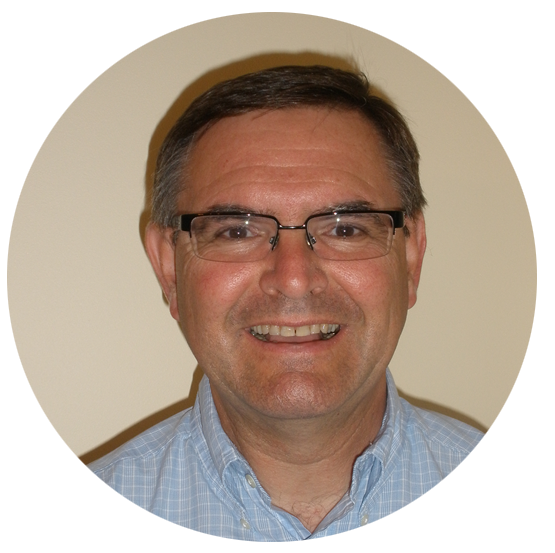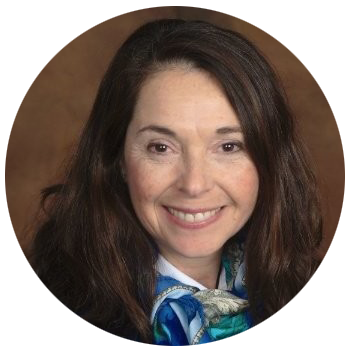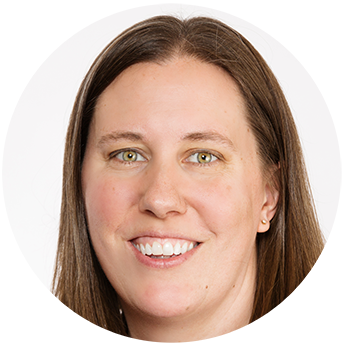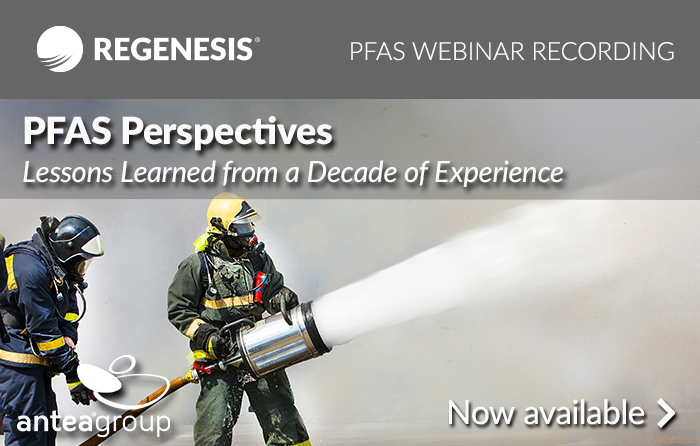In this webinar we were pleased to have as special guest speakers Jack Sheldon, Senior Remediation Specialist at Antea Group, and Caron Koll, PG, LSP, and PFAS Lead at Antea Group. Their presentation discussed lessons learned from a decade of experience working with PFAS contaminants in groundwater. They were joined by Kristen Thoreson PhD, VP of Research and Development at REGENESIS, who discussed eliminating risk from PFAS via low-cost, in situ remediation with colloidal activated carbon.
Key topics addressed in this free webinar:
-
How to create a custom sampling program, demonstrated by a case study of an environmental site
-
A method you can use to sort the chaos out of your data
-
How to determine whether a product contains PFAS by looking at a Safety Data Sheet (SDS)
Complete the form on this page to view the recording of this free webinar.
About the Presenters:
 Jack Sheldon
Jack Sheldon
Senior Remediation Specialist | Antea® Group
Jack Sheldon is Senior Remediation Specialist at Antea Group. Jack is a remediation expert with over 37 years of industry experience. He has specialized in the field application of various types of bioremediation and chemical oxidation and reduction systems, with personal involvement in more than two dozen first-type remediation projects in their respective states. He has completed remediation projects in all 50 states and several locations abroad. Jack is a member of Antea Group’s PFAS Management Team, which provides clients updates on PFAS information, completes sampling programs, and consults on strategies related to PFAS risk identification and mitigation. He is especially versed in conventional and new technologies for PFAS remediation.
 Caron Koll, PG, LSP
Caron Koll, PG, LSP
PFAS Lead | Antea® Group
Over the span of 36 years, Caron Koll has developed focused environmental response actions and managed hundreds of environmental investigations and remedial projects in the Northeast and Midwest United States and South America. During that period, Caron met or exceeded client expectations to develop an enviable reputation within the industry. Caron attributes her success to understanding client needs, an in-depth knowledge of applicable environmental laws and regulations, and an aptitude for identifying creative and cost saving solutions. Caron has experience serving a wide spectrum of industrial clients including: chemical manufacturing, oil and gas, energy, automotive, transportation, and general manufacturing. Contingent on client needs and regulatory drivers, she is an account leader and manages, directs, and oversees the development and implementation of environmental remedial investigations including conceptual site models, feasibility studies, permitting, remedy design, remedy implementation, and remedy operations through to post closure. With a focus on client’s needs and expectations, Caron has been responsible for advising clients of appropriate and compliant response actions and the path forward to achieve client end state goals. Foremost, as a project and account manager, Caron is responsible for collaborating with clients on forecasting future needs based on global business economic dynamics and relevant regulatory mandates. She is responsible for managing, overseeing, directing, and mentoring, as well as contracting and managing/controlling budgets.
 Kristen Thoreson, PhD
Vice President of Research and Development, REGENESIS
Dr. Kristen Thoreson heads the chemical research and product development program at REGENESIS. Her team is focused on developing advanced technologies for the treatment of recalcitrant compounds in mixed environmental media. She is trained as a chemist, and her graduate and post-doctorate research focused on mechanistic investigations of chlorinated ethene degradation pathways using molecular models and compound specific isotope analysis (CSIA) for both biotic and abiotic systems. She obtained her BSc in chemistry from the University of Wisconsin – La Crosse, and her PhD in inorganic chemistry from the University of Minnesota. She also spent time as a postdoctoral associate at the Helmholtz Zentrum in Munich, Germany as a part of the Research Unit for Environmental Organic Isotope Chemistry.
Kristen Thoreson, PhD
Vice President of Research and Development, REGENESIS
Dr. Kristen Thoreson heads the chemical research and product development program at REGENESIS. Her team is focused on developing advanced technologies for the treatment of recalcitrant compounds in mixed environmental media. She is trained as a chemist, and her graduate and post-doctorate research focused on mechanistic investigations of chlorinated ethene degradation pathways using molecular models and compound specific isotope analysis (CSIA) for both biotic and abiotic systems. She obtained her BSc in chemistry from the University of Wisconsin – La Crosse, and her PhD in inorganic chemistry from the University of Minnesota. She also spent time as a postdoctoral associate at the Helmholtz Zentrum in Munich, Germany as a part of the Research Unit for Environmental Organic Isotope Chemistry.

